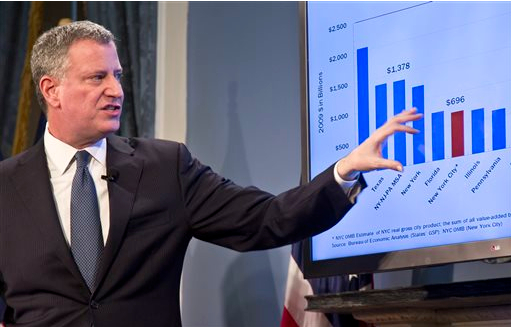De Blasio bolsters spending to social services, police in NYC budget

Mayor Bill de Blasio outlined his yearly preliminary budget on Monday, taking advantage of the city’s strong economic health to fund services for the less fortunate while also increasing resources to the city agencies that help keep the nation’s largest city safe.
De Blasio outlined a $77.7 billion financial vision that, thanks to higher-than-projected revenues, closes a $1.8 billion deficit and extends the reach of government while not including any tax increases, service cuts or layoffs of municipal workers.
“When we make decisions to invest, we do so in a very targeted manner according to our priorities,” he said during the budget presentation at City Hall. “The goal with each investment is to create a stronger city, a safer city, a fairer city.”
